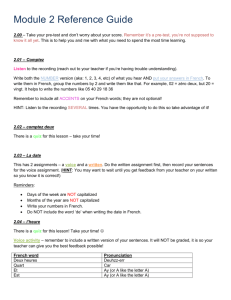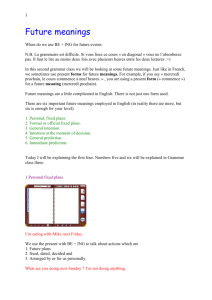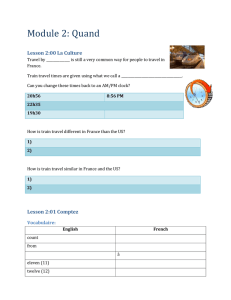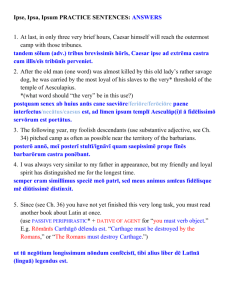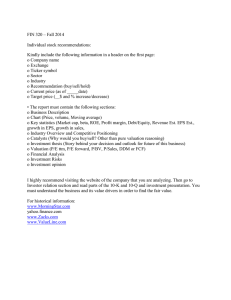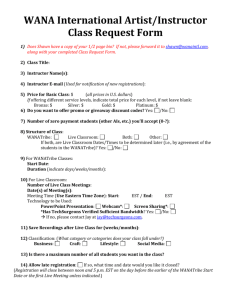Au Collège Booklet - Hyndland Secondary School
advertisement
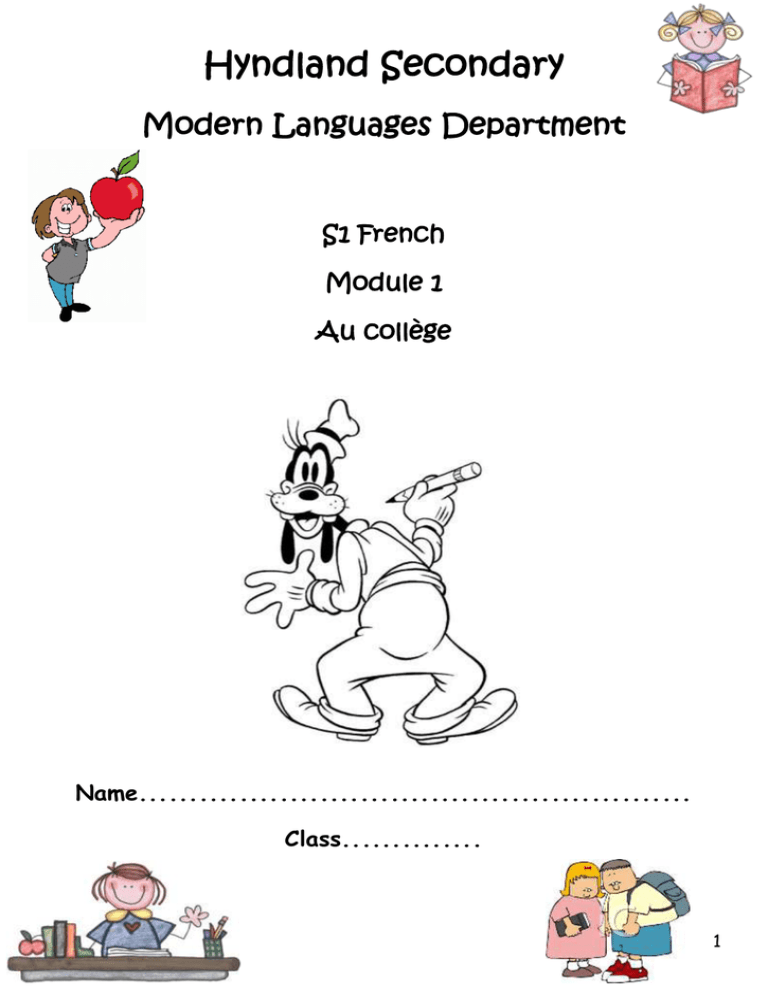
Hyndland Secondary Modern Languages Department S1 French Module 1 Au collège Name....................................................... Class.............. 1 Au collège Topics I will cover Grammar I should learn: 1. Nouns: Classroom language: masculine and feminine. ‘a’ and ‘the’ 2. Subjects and opinions: Adjectives: position agreement Verbs: avoir (to have) Negatives: ne....pas ‘my’ masc, fem and plural Verbs: être (to be) faire (to do) 3. Time and timetables: Telling the time 4. Daily routine: Verbs: using a dictionary changing verb endings using: je I, il he, elle she, on we, Expanding sentences 5. Schools in other countries: Pupil research on differences between schools in Scotland and those in other countries. 2 Section 1 Classroom language Les instructions- classroom commands Check your vocabulary for any of which you are unsure. Ouvrez les livres Fermez les livres Sortez vos livres! Les instructions! Levez la main! Ecrivez! Silence! Levez-vous! Regardez le tableau blanc! Speaking Take turns to give the rest of your group instructions. How well did you understand? Ask your partner to rate your performance. Ouvrez vos cahiers Travaillez à deux Fermez les cahiers Ecoutez la cassette Ouvrez la fenêtre Prenez un stylo / un crayon Fermez la porte 3 Les affaires pour le collège (School objects) Dictionary Skills un or une? Outcome 3-11a/b Your teacher will introduce a few things you use at school. Remember that all objects are NOUNS. When you write them down you should note whether they are masculine or feminine. Add your own objects in this box: En classe Dictionary Skills (In the classroom) le, la or l’? Add some more familiar classroom objects in this box: 4 Les couleurs (colours) Colour in the words in the correct colour!! 5 Grammar How to say ‘a’ livre (m) book un livre a book règle (f) ruler une règle a ruler Look at the following words and decide if they are feminine (f) or masculine (m). Outcome 3-11a/b a) b) c) une chaise = f un crayon une trousse e) f) g) une gomme un livre un cahier Translate the following words into French, adding un or une. a) b) c) d) a door = une porte a teacher a rubber a pen e) f) g) h) a white board a calculator a sharpener a mobile phone Grammar How to say ‘the’ nm nf before a vowel/silent ‘h’ npl le la l’ les le sac la porte l’hôpital les crayons 6 Write the correct word for ‘the’ before each noun. a. b. c. d. crayon crayons porte horloge e. f. g. h. fenêtre calculatrice professeur règles Listening Your teacher will help you practice listening out for classroom objects and instructions. Métro page 8, Ex 1a & page 17 ex 4b Note your scores here:______________________ Grammar How to make adjectives agree un une des (m) des (f) bleu bleue bleus bleues jaune jaune jaunes jaunes blanc blanche blancs blanches marron marron marron marron Translate the following into English. a) une trousse rouge e) un portable marron b) une gomme grise f) un sac vert c) des cahiers noirs g) des gommes blanches 7 Now translate the following into French. a) b) c) a blue jotter a white pencil case an orange rubber e) f) g) some blue pencils some orange rubbers some white rulers. Listening Can you note down objects or colours? Métro p16 Note your score here _______ Grammar Using ‘avoir’ – ‘to have’ (see page 31) ‘Avoir’ means ‘to have’. You will find it in your verb list in section 6. Don’t forget that you use the verb ‘avoir’ to give your age in French! Fill in the correct part of ‘avoir’. a) J’____ un cahier. c) Marie___ trois crayons. b) Tu ___ un stylo? d) On ___ trente euros. 8 Grammar Saying “I don’t have a/any” Je n’ai pas de crayon I don’t have a pencil Il n’a pas de stylo He doesn’t have a pen On n’a pas de livres We don’t have any books Je n’ai pas d’animal I don’t have a pet Try putting the following into French: a) b) I don’t have a rubber. He doesn’t have a pencil case. c) d) . Paul doesn’t have a bag. We don’t have any pencils. Grammar How to say “There is/there isn’t…” There is: Il y a… There isn’t: Il n’y a pas de… Il y a un crayon. There is a pencil. Il n ‘y a pas de tables . There aren’t any tables. What do these sentences mean? a) Il y a une chaise. 1) Il n’y a pas de stylos. b) Il n’y a pas de tableau blanc. 2) Il y a une trousse. c) Il y a une grande fenêtre. 9 Section 1 Classroom Language Colour in the stars (green, yellow, and red) according to how confident you feel about being able to do the following things: I can… 1) Understand some classroom commands Outcome 3-01a 2) Give the French for at least 6 items in my schoolbag. 3) Give the French for at least 6 items in my class. 4) Say most basic colours in French. 5) Use a dictionary to find a noun. 6) Check whether a noun is masculine or feminine and give the correct word each time for ‘a’. 7) Change from ‘a’ to ‘the’ with both masculine and feminine nouns. 8) Agree colours when describing masculine and feminine nouns. 9) Use the verb ‘to have’ with different people. 10) Use ne and pas to say what I do not have. Practised at home on : _____________ (Date) ___________________ (Signed - Parent) Checked in class on :______________ (Date) ____________________ (Signed, Classmate) Notes for next time :__________________________________________________________ __________________________________________________________________________ __________________________ _____________________ (Signed, Teacher) 10 Section 2 Subjects and Opinions Mes matières My subjects le français . la géographie French l’histoire history les sciences science geography Writing Write out your own subjects below : Reading Can you translate the following phrases into English? Use your vocabulary list to help you! 1. 2. 3. 4. 5. J’aime le français! Je déteste le sport. J’adore les sciences. Je n’aime pas l’histoire. L’histoire, c’est amusant. 6. 7. 8. 9. Les maths, c’est nul. Les travaux ménagers, ça va. L’anglais, c’est super. Le dessin, c’est ma matière préférée. 11 Grammar In French, when you give your opinion about a school subject, you leave in the word for ‘the’ : le/la/l’/les. J’adore la géographie. I love geography. L’éducation physique, c’est amusant. P.E. is fun. Writing Can you translate the following sentences into French? 1. 3. 5. I love maths. I don’t like R.M.E. History is boring. 2. 4. 6. Writing I hate science! I like Home Economics. Geography is my favourite subject. Now write down your opinions of your own subjects, in French. When you are writing French, you should try to make your sentences as sophisticated as possible. One way to do that is to give reasons for what you are saying. e.g. J’aime l’anglais parce que le prof est sympa. I like English because the teacher is nice. You could try to extend your sentences even further by using “et” and “mais”. 12 Listening You are going to listen to ten people telling you about their favourite subjects. A)Which subjects do they like/dislike? (20) B) What do they think of the subjects on right? Métro page 51 ex 1, page 52 ex 2 Write your score here _____________________________ Reading Can you translate what these people have said into English? J’adore les sciences 1. 2. 3. parce que c’est facile! Je n’aime pas la géographie parce que le prof est sévère. La musique, c’est ma matière préférée, parce que c’est très intéressant . 4. Je déteste les maths parce que nous avons beaucoup de devoirs ! 13 Speaking With your partner take it in turns to say whether you like/dislike these subjects with the reason why. Writing Can you write some sentences of your own, explaining why you like/dislike a certain subject? Remember to use ‘parce que…’ (‘because…’) in your writing. Listening These people are giving more difficult opinions about maths. What does each person say? Note your answers in your jotter. Métro page 41, ex 3a Write your score here ______________________________ 14 Speaking With your partner, read the conversation and change the details in bold. Tu aimes le dessin? Non, je n’aime pas le dessin. Pourquoi? Parce que c’est ennuyeux. Au secours! pourquoi? why? parce que because Grammar (‘My’) mon prof préféré (m) my favourite teacher. ma matière préférée (f) my favourite subject. mes profs preferes (mpl) my favourite teachers. mes matières préférées (fpl) my favourite subjects. What word should you use for ‘my’ in front of the following? Write out the full French phrase. 1. 2. 3. stylo (m) gomme (f) cahiers (mpl) 6. 7. 8. trousse (f) crayon (m) règles (fpl) Reading Do you remember what the words above mean? How many of the phrases you have just written can you translate into English? 15 Writing Write out the following in French. 1. my jotters Grammar 2. my rulers 3. my books 4. my pens (‘être’ – ‘to be’ – see page 31) Write the correct part of the verb ‘etre’ into the following sentences. You might need to check the back of your booklet if you need help. 1. 2. 3. Je ______ écossais(e). Tu ______ anglais. Il ______ marrant. Grammar 4. 5. (‘faire’ – ‘to do’ On ______ timide. Elle ______ bavarde. – see page 31) Write the correct part of the verb ‘faire’ into the following sentences. You might need to check the back of your booklet if you need help. 1. 2. 3. 4. 5. je ______ elle _____ on ______ tu ______ il ______ 16 Subjects and Opinions What can you do? Colour in the stars (green, yellow, and red – like traffic lights!) according to how confident you feel about being able to do the following things: I can.… 1) Give the French for all my subjects. 2) Give my opinion on subjects. 3) Add reasons for my opinions. 4) Talk about my teachers. 5) Use parce que to make my sentences more sophisticated. 6) Give the correct word for ‘my’ depending upon whether words are masculine, feminine or plural. 7) Use the verb ‘to be’ with different people. 8) Use the verb ‘to do’ with different people. Practised at home on …………………. (Date), (Signed - Parent)……………………… Checked in class on ……………………. (Date), (Signed – Classmate)…………………. Notes for next time ………………………………………………………………………………………………. ………………………………………………………………………………………………………………………………………… ……………………………………………………………………………(signed) …………………………………... 17 Section 3 Time and timetables Reading What are these French pupils telling you about their timetable? 1) J’ai maths lundi à dix heures. 2) J’ai EPS samedi à huit heures. 3) On a allemand mardi à cinq heures. 4) On a dessin vendredi à trois heures. Speaking Now you should be able to talk a bit about your own timetable. Prepare a few statements to tell the rest of your class. They will note down what you are saying and you can check if they are correct. Reading / Dictionary Skills Here are a few more complicated statements. Work with a partner to see if you can turn them into English. 1. On a anglais mardi à deux heures et puis jeudi à onze heures. 2. Mercredi, j’ai francais à neuf heures et après ça j’ai histoire-géo à dix heures. 3. Je commence vendredi avec sciences à neuf heures et ensuite j’ai espagnol à dix heures. Writing Now write down some statements about your timetable – perhaps you could go through one whole day. Try and use some of the words above to make your sentences more complex. 18 Speaking Work with a partner giving each other times to say in French. How well did you do? Listening Your teacher will tell you some times in French. Note down what they are in your jotter. How well did you do? Note your score here: ___________ Section 3 Time and Timetables What can you do? I can… Colour in the stars (green, yellow, and red) according to how confident you feel about being able to do the following things: 1) Understanding times in French. 2) Saying the time in French. 2) Talking about my own timetable. Practised at home on : _____________ (Date) ___________________ (Signed - Parent) Checked in class on :______________ (Date) ____________________ (Signed, Classmate) Notes for next time :__________________________________________________________ ___________________________________ ____________________(Signed, Teacher) 19 Section 4 Mon école, ma routine, mes verbes. My daily routine Je quitte la maison. Je rencontre mes amis. Je parle avec mes amis. J’arrive à l’école. J’écoute le prof. Je travaille en classe. Je regarde la télé. Je tape à l’ordinateur. Je mange à la cantine. Je joue avec mes amis. Je visite la bilbliothèque. Je quitte l’école. Reading 1) Can you work out the meaning for each of these daily activities? You may need to refer to the key word section at the back of this booklet. 2) Each of the sentences above describes something we do at school, each sentence has a verb – a ‘doing’ word - can you underline the verb in each sentence? 20 Grammar How to use verbs we find in a dictionary When we use a dictionary to find verbs they look different – here are a list of the verbs used above as you would find them in a dictionary. arriver chanter manger jouer aimer travailler regarder taper visiter What do you notice about the endings of all these verbs when they are listed in the dictionary? Copy these verbs out – IN ALPHABETICAL ORDER – as they would be in a dictionary. Now add their English meaning, choosing from the list below: to visit to arrive to work to sing to watch to eat to type to play to like Grammar How to change verbs we find in a dictionary. As you have already noticed, all these verbs end in ‘er’ when found in the dictionary but if you look back to A: My daily routine you will notice that each verb has been changed slightly. When we use a verb that we have found in the dictionary we have to: (i) add in a person to do the verb – e.g. ‘je’ = I, ‘il’ = he, ‘she’ = elle (ii) change the ending = e.g. -e 21 Now write out the following using the verbs in Exercise B (give verbs and persons) 1. He works in class. 2. I talk to my friends. 3. She eats in the canteen. 4. I arrive at school. 5. She listens to the teacher. 6. He types on the computer. Grammar How to talk about what ‘we’ do. ’on’ is a very useful little word, often used to mean ‘we’ – and also uses the ending ‘e’ with most verbs eg: on arrive = we arrive Write the following in French: 1. We eat in the canteen. 2. We visit the library. 3. I arrive with my friends 4. We watch the television. 5. We work in class. Grammar Summary What I should now know about verbs. Verbs are doing words and are used to talk about activities we do every day when we look up a verb in a dictionary, most of the time we will find a verb in French ending in ‘er’ each time we use a verb we need to use a person to show who we are talking about – so far we can use je, il, elle or on the verb we find in the dictionary has to change at the end – for each of the people we have learned so far, the ending is ‘e’. 22 Look up the following verbs in French in a dictionary (Handy hint… each one is an ‘er’ verb!) 1. to like 2. to hate 3. to draw 4. to sing 5. to prepare Use your new list of verbs to write the following. (Don’t forget to choose the correct word in French for the person doing the verb and to change the end of the verb). 1. I like my school. 2. He hates the library. 3. We draw in class. 4. She sings in music. 5. I prepare my bag. Here are a few sentences to complete in French (The verb you need is at the end in brackets but don’t forget to change it when you add it to the sentence). 1. J’………. le week-end! C’est chouette! (adorer) 2. Je ………. souvent la télé en classe – c’est intéressant. (regarder) 3. Le matin je ………. des céréales. C’est délicieux. (manger) 4. Je ………. de temps en temps la bibliothèque – c’est très utile. (visiter) 5. Avec mon prof de sport quelquefois on ………. au badminton – c’est amusant. (jouer) 6. On ……… souvent en musique – c’est relaxant. (chanter) Grammar Adding in the time You can make talking about your daily routine more meaningful by adding in an idea of time. e.g. Je quitte la maison à 8 heures. 23 Finish the sentences adding in a time that suits you: 1. Je quitte la maison… 3. Je parle avec mes amis…. 2. J’arrive à l’école… 4. Je quitte l’école... Grammar Adding ideas of time There are other ways of giving an idea of time without using a specific time. Here are a few ideas. le matin l’après-midi toujours souvent le soir tous les jours tôt après ensuite de temps en temps Copy the phrases in the above grammar box and then check their meanings – write out a few sentences using some of these time phrases. Story telling Le matin je quitte la maison à 8 heures – c’est tôt. Après ça je rencontre mes amis vers huit heures dix – c’est amusant – j’adore mes amis! Normalement j’arrive à l’école à 9 heures moins le quart – c’est nul parce que je déteste l’école! In the above story we have tried to add as many extra ideas as possible to make it more interesting. 24 Writing 1) Translate the story on the previous page into above English. You will notice that the extra details include time phrases as well as opinions. 2) Try adding details yourself: Step 1: Take a basic verb phrase you have been using e.g. Je mange à la cantine Step 2: Add a time phrase (or maybe two!) e.g. Normalement je mange à la cantine à une heure Step 3: Add an opinion e.g. Normalement je mange à la cantine à une heure – j’aime la cantine Step 4: Anything else? e.g. Normalement je mange à la cantine à une heure – j’aime la cantine – c’est super! 3) Now try and write a few extended sentences yourself. Outcome 3-06a/b 25 Section 4 My daily routine What can you do? Colour in the stars (green, yellow, and red – like traffic lights!) according to how confident you feel about being able to do the following things: I can… 1) Say at least 6 sentences to talk about my daily routine. Outcome 3-06a/b 2) Find a verb in a dictionary. 3) Change the ending of an ‘er’ verb. 4) Use verbs with je, il and elle. 5) Use verbs with on. 6) Add in time or an idea of time to my sentences on my daily routine. Outcome 3-06a/b 7) Begin to extend my daily routine sentences. Practised at home on: ………………… (Date), (Signed)…………………………… Checked in class on : ……………………. (Date) Notes for next time : ………………………………………………………………………………… …………………………………………………………………………………………………………………………………... (Signed)………………………….. 26 Section 5 Research Schools in other countries You have already picked up quite a lot of information about school in France: School starts around 8am. Many children still go to school on Saturday mornings. French pupils do not wear uniform. Task Research a country of your choice and find out what is different about school in that country compared to Britain and compared to France. Be prepared to present your findings to the rest of your class – in English. Have some visual aids to help with your presentation – your teacher can then display your findings in class. Assessment Review How do you think your presentation went? Colour in the stars (red, yellow or green) according to how confident you feel.Outcome 3-06a/b I can present my research to the class clearly. I can use visual aids to display information. I can respond to questions about my research. What I can do to improve my next presentation____________________ _______________________________________________________ 27 Section 6 Basic key words and phrases A: Classroom commands Ouvrez les cahiers Fermez les cahiers Ouvrez la fenêtre Fermez la porte Travaillez à deux Écoutez la cassette/le CD Prenez un stylo/un crayon Qu’est-ce que c’est? C’est un/une… B: School objects un cahier un crayon une gomme un livre C: Open your jotters Close your jotters Open the window Close the door Work in pairs Listen to the cassette/the CD Take out your pen/pencil What is it? It’s a… a jotter a pencil a rubber a book une règle un sac un stylo une trousse a ruler a bag a pen a pencil case Classroom objects le professeur le tableau blanc la porte il y a the teacher the white board the door there is/there are la fenêtre the window la table/les tables the table(s) la chaise/les chaises the chair(s) blanc (he) bleu(e) gris(e) jaune white blue grey yellow noir(e) orange rouge vert(e) marron brown D: Colours black orange red green 28 E: Subjects le français le dessin le sport le théâtre la géographie la musique la technologie la politique les travaux ménagers F: French art P.E. drama geography music technical modern studies Home Economics history English German Spanish P.E. science maths R.M.E. Opinions j’adore I love j’aime I like je n’aime pas I don’t like je déteste I hate pourquoi ? why ? parce que… because… c’est amusant it’s fun c’est facile it’s easy c’est ma matière préférée G: l’histoire l’anglais l’allemand l’espagnol l’éducation physique les sciences les maths la religion c’est amusant it’s fun c’est facile it’s easy c’est intéressant it’s interesting c’est génial it’s great ça va it’s okay c’est nul it’s rubbish c’est difficile it’s difficult c’est ennuyeux it’s borin it’s my favourite subject Days of the week lundi mardi mercredi jeudi vendredi samedi dimanche le lundi Monday Tuesday Wednesday Thursday Friday Saturday Sunday on Mondays 29 H: Time Quelle heure est-il? il est deux heures il est deux heures cinq il est deux heures dix il est deux heures et quart il est deux heures vingt il est deux heures vingt-cinq il est deux heures et demie il est trois heures moins vingt-cinq il est trois heures moins vingt il est trois heures moins le quart il est trois heures moins dix il est trois heures moins cinq il est une heure il est midi il est minuit à deux heures I: What time is it? it’s 2 o’clock it’s 5 past 2 it’s 10 past 2 it’s ¼ past 2 it’s 20 past 2 it’s 25 past 2 it’s ½ past 2 it’s 25 to 3 it’s 20 to 3 it’s ¼ to 3 it’s 10 to 3 it’s 5 to 3 it’s 1 o’clock it’s midday it’s midnight at 2 o’clock Daily routine Je quitte la maison. Je rencontre mes amis. Je parle avec mes amis. J’arrive à l’école. J’écoute le prof. Je travaille en classe. Je regarde la télé. Je tape à l’ordinateur. Je mange à la cantine. Je joue avec mes amis. Je visite la bilbliothèque. Je quitte l’école. I leave the house. I meet my friends. I talk with my friends. I arrive at school. I listen to the teacher. I work in class. I watch the television. I type on the computer. I eat at the cantine. I play with my friends. I visit the library. I leave the school. 30 J: Avoir j’ai I have tu as you have il/elle a he/she has on a we have nous avons we have vous avez you (pl.) have ils/elles ont they have je n’ai pas de.. I don’t have any… K: Etre je suis I am tu es you are il/elle est he/she is on est we are nous sommes we are vous êtes you (pl.) are ils/elles sont they are L: Faire je fais I do tu fais you do il/elle fait he/she does on fait we do nous faisons we do vous faites ils/elles font you (pl.) do they do 31
